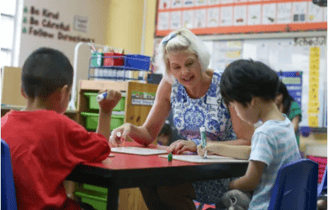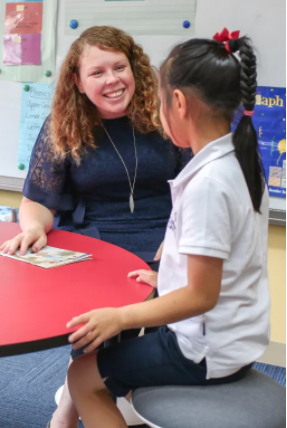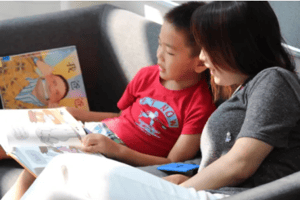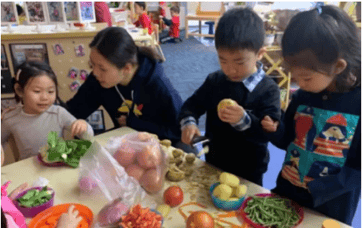
Well-developed conversational skills are extremely important for adults.
They help us to communicate thoughts, opinions and information in the workplace and in our personal lives.
Through conversation with others, we exchange ideas and express feelings and emotions. The same is true for children, and there are many things we as parents can do to help our young ones develop their verbal and conversational skills.
Conversations with young children can often seem one sided, especially as their verbal skills are just beginning to blossom. However, when we encourage them to communicate often and are good listeners, we not only help them to develop strong verbal skills but we also will build a relationship of love and trust.
Here are a few things you can try at home that will provide excellent opportunities for your child’s verbal and conversational skills to grow and grow.
IT IS IMPORTANT TO NOTE THAT THE ATTENTION SPAN FOR 3-YEAR-OLDS IS APPROXIMATELY 3-8 MINUTES AND MAY BE 15 MINUTES FOR 4- AND 5-YEAR-OLDS, WHEN LEFT TO THEIR OWN INTEREST.
THIS FACT IS GOOD TO REMEMBER WHEN HELPING YOUR CHILD BUILD VERBALIZATION SKILLS. REMEMBER TO PRACTICE LANGUAGE IN SHORT SESSIONS, SEVERAL TIMES A DAY.
Modeling Conversational Behavior

It goes without saying that we should be careful what we say around children, because they have a habit of picking up all kinds of words and phrases, even those we prefer they don't.
This is why modeling appropriate language is so important for young learners. We should also model good conversational behavior by being attentive, making eye contact and demonstrating patience we converse with young children.
Allowing and creating situations, where children need to describe wants and needs, builds vocabulary and verbal skills.
Try storing desired toys, clothes, foods or objects just out of reach but in sight of your children. Ask them to use their words to describe the items they are requesting.
Modeling the longer version of a reply can happen multiple times a day in authentic settings.
Example: You would like orange juice? Your child replies “Yes”. Parents can reply: Yes, I would like orange juice to drink. You can ask them to repeat your sentence.
Games, Books and Photographs

Children learn through fun and games. Games, books and photographs offer great teachable moments for how to carry out back and forth exchanges, how to stay on topic and how to answer questions using good manners.
Face to face games provide a vast amount of opportunity for verbalization. Learning simple rules, naming symbols, counting and following directions are all great for expanding verbal skills and they also teach cooperation and teamwork.
Games on devices and TV viewing don’t often provide adequate practice of these type verbalization skills.
When sharing books together, help children say names and labels of colors, and describe objects and feelings of the characters.
Young children will often offer up simple words to describe images. You can build off their responses by repeating what they say and adding more to the concept.
For example: “Happy – Yes, the boy is happy he has a truck, he is not sad.” Or “Daddy – Yes, the daddy is taller than the boy.”
Children love to see themselves and people they know in photos. Luckily, we have easy access to photos and videos on our phones. These are great visual aids and provide storytelling practice.
Using personal photos and videos, help your child create a story. Ask: “Who do you see?” “Where are they?” “What is happening?” and “How did they feel?” One or two photos a day provides fun practice and an activity they will want to repeat.
Take Advantage of Everyday Learning

Everyday verbalization around social language offers children the chance for repetitive practice. It is the same task in similar settings, with similar people.
With young children, always practice by using small steps and short periods of time. Example for teaching greetings, start with “Hello” and build up to longer phrases like “Hello, how are you today?”
Specific vocabulary is needed to express certain behaviors and manners. Having new experiences, attending different events can cause uncertainty. It is wise to discuss behavioral expectations before the event or situation.
Even roleplaying words to use and actions that would be appropriate can be helpful. Pretending you are the child and they are the adult is a fun way to introduce behaviors such as making eye contact, respecting personal space and appropriate facial expressions.
“Good job!” is a praise often heard but very vague and has little impact. Think about the words and behaviors you would like to see your child repeat. Positive and specific praise helps your child remember what to say and do. You can say specific, saying things such as: “Did you see the smile on Mr. Smith’s face? He was so happy, you said good morning and wished him a nice day!”
Verbalization is a skill to foster throughout our lives. Learning when to listen and when to talk can be difficult. Communication and conversations build relationships filled with love and trust.
As our children grow and have life experiences, such as dating, death of a loved one, celebrations and other situations wrapped in emotions, we want them to be able to communicate and have meaningful conversations not only with us, but everyone they interact with throughout their lives.
Follow the links to see Mrs. Lambert's full presentation on Developing Verbal Skills on Youtube (VPN required).




